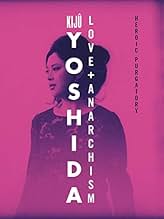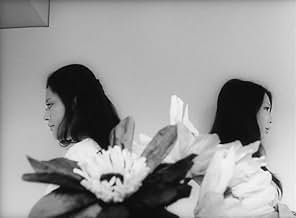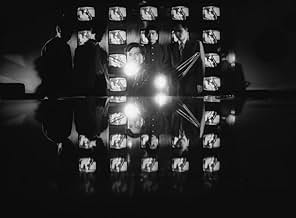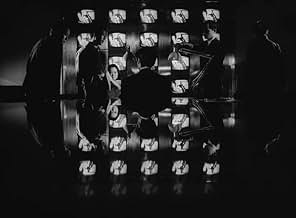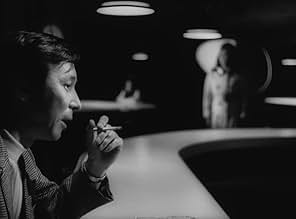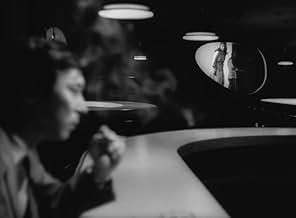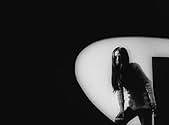La moglie di un ingegnere torna a casa con una ragazza che era perduta. Un uomo compare come il padre e cerca di riaverla, facendo che l'ingegnere ricordi la sua giovinezza come un rivoluzio... Leggi tuttoLa moglie di un ingegnere torna a casa con una ragazza che era perduta. Un uomo compare come il padre e cerca di riaverla, facendo che l'ingegnere ricordi la sua giovinezza come un rivoluzionario, tra tempo e spazio, fantasia e realtà.La moglie di un ingegnere torna a casa con una ragazza che era perduta. Un uomo compare come il padre e cerca di riaverla, facendo che l'ingegnere ricordi la sua giovinezza come un rivoluzionario, tra tempo e spazio, fantasia e realtà.
Recensioni in evidenza
From the very first frame, you know you are in for something different. The first thing that strikes you is the composition of the visuals. Each frame is an avant-garde work of art. If you turned off the sound and simply watched the visuals it would be worth the time.
The plot is complex and enigmatic. Intentionally ambiguous, it deals with love, truth, reality and the validity of political action. Although it is enigmatic, it is not boring. Instead it stimulates thought on these subject. The ambiguity of the plot means that there are no easy answers and viewers must make up their own minds on these weighty subjects. It also means that the film can be viewed several times.
This is an "art film". The director was a major figure in the Japanese new wave that started in the 60's and watching this film one is reminded of Alain Resnais, although this is not a copy of his style. The film is part of a trilogy of "sex and politics" films (Eros plus massacre; Heroic Purgatory ; Coup D'Etat).
You will not like this if you are looking for an entertaining film, or a film with action, sex, comedy, great one liners and all those other things that can make a film entertaining. There is nothing wrong with such films but this one one of them. It is a film that will make you think.
Finding a good copy of this or any of this director's other films can be difficult. This particular film can be found if you search the internet but it is usually found with very poor and incomprehensible subtitles. Recently someone has made a new subtitle translation but it is very hard to find. I wouldn't recommend the film without this new translation unless you are a Japanese speaker. Subtitles that begin "This morning I lift the floor There are 3 worms" should be avoided. Those that begin "This morning, there were three cockroaches," are good. But on the other hand just watching the visuals can be worth it.
The plot is complex and enigmatic. Intentionally ambiguous, it deals with love, truth, reality and the validity of political action. Although it is enigmatic, it is not boring. Instead it stimulates thought on these subject. The ambiguity of the plot means that there are no easy answers and viewers must make up their own minds on these weighty subjects. It also means that the film can be viewed several times.
This is an "art film". The director was a major figure in the Japanese new wave that started in the 60's and watching this film one is reminded of Alain Resnais, although this is not a copy of his style. The film is part of a trilogy of "sex and politics" films (Eros plus massacre; Heroic Purgatory ; Coup D'Etat).
You will not like this if you are looking for an entertaining film, or a film with action, sex, comedy, great one liners and all those other things that can make a film entertaining. There is nothing wrong with such films but this one one of them. It is a film that will make you think.
Finding a good copy of this or any of this director's other films can be difficult. This particular film can be found if you search the internet but it is usually found with very poor and incomprehensible subtitles. Recently someone has made a new subtitle translation but it is very hard to find. I wouldn't recommend the film without this new translation unless you are a Japanese speaker. Subtitles that begin "This morning I lift the floor There are 3 worms" should be avoided. Those that begin "This morning, there were three cockroaches," are good. But on the other hand just watching the visuals can be worth it.
Pure geometric chaos in Yoshida Yoshishige's "Heroic Purgatory", which is also the second film in his Trilogy of Japanese Radicalism, produced under the aegis of Japan's legendary Art Theater Guild. This is probably my fav film of his, especially in terms of visuals. Watching it feels like falling into a trance, I keep chasing the high of watching Heroic Purgatory, but no other Yoshida movie has come close.
Yoshida's strength is without a doubt his image composition, the way he frames his shots is so meticulously done. The story centers around an engineer and his wife (played by the great Hiroshi Inagaki regular Mariko Okada, who is also Yoshida's spouse and long term collaborator) who find a lost teenager leading the engineer to recall his younger days as a political radical. As this narrative plays out, Nanako's husband tells the story of his past when they met in a time when he was involved in reformist politics. Underneath, this film explores the past, present and future of the early 1970's political radicalism in a volatile Japan. As the film progresses, the temporal space is crushed mixing past, present, and future together. Abandoning linear storytelling for an ethereal trip into a labyrinth of memories, fears and delusions Yoshida gives viewers a stylistic feast injected into a revolutionary thriller. Cinematographer Motokichi Hasegawa and editor Hiroyuki Yasuoka, presents a visual language that recalls other great films (appropriate given Yoshida's background as a film critic...he also wrote a book on the films of Yasujiro Ozu) while continually exploring new ground; there's so many compositions, so many scenes that defy the conventional expectations of filmmaking...it's absolutely intoxicating to behold. Toshi Ichiyanagi's score is also a tremendous win, giving an atmospheric almost science fiction-like vibe to accentuate the stunning visuals.
Yoshida's strength is without a doubt his image composition, the way he frames his shots is so meticulously done. The story centers around an engineer and his wife (played by the great Hiroshi Inagaki regular Mariko Okada, who is also Yoshida's spouse and long term collaborator) who find a lost teenager leading the engineer to recall his younger days as a political radical. As this narrative plays out, Nanako's husband tells the story of his past when they met in a time when he was involved in reformist politics. Underneath, this film explores the past, present and future of the early 1970's political radicalism in a volatile Japan. As the film progresses, the temporal space is crushed mixing past, present, and future together. Abandoning linear storytelling for an ethereal trip into a labyrinth of memories, fears and delusions Yoshida gives viewers a stylistic feast injected into a revolutionary thriller. Cinematographer Motokichi Hasegawa and editor Hiroyuki Yasuoka, presents a visual language that recalls other great films (appropriate given Yoshida's background as a film critic...he also wrote a book on the films of Yasujiro Ozu) while continually exploring new ground; there's so many compositions, so many scenes that defy the conventional expectations of filmmaking...it's absolutely intoxicating to behold. Toshi Ichiyanagi's score is also a tremendous win, giving an atmospheric almost science fiction-like vibe to accentuate the stunning visuals.
I felt much the same way about this one as I felt about the previous, more famous Yoshida film I watched last week, Eros + Massacre: it's gorgeous but maddeningly esoteric. As a result of its difficulty, I found the film fairly boring. This one is perhaps even more difficult than Eros + Massacre, but it's also 90 minutes shorter, so I'd rate them pretty much even. The film involves Communist revolutionaries in Japan, who were more or less outlawed in the country by the U.S. The film spans several time periods, including the distant future of 1980 (you can tell it's the future because of the theremin music). The main action begins in 1952, which was a turbulent year for student protests. One might just watch it for the visuals - what Yoshida does with space is absolutely astounding at times. The filmmaking often brings to mind Antononi and Resnais. But it's hard to watch it just for the visuals when you know Yoshida is trying to get at something and is so deadly serious about it.
'Heroic Purgatory' has suffered most of from the obscurity into which Yoshida's trilogy of radicalism has been cast. At least an hour shorter than its predecessor, 'Eros Plus Massacre', it takes that film's tendency to narrative compression and ellipses to an extreme, and a first viewing may render elements virtually incomprehensible, as Yoshida's characteristically bleached-out, askew framing renders public, exterior space a bleached-out, ghostly horizon, glimpsed in the distance as if in perpetual mist or blinding sunlight, and domestic, and interior space an endless series of corridors or bedrooms, of secret spaces, in which characters endlessly circle the space and each other.
The film opens as Nanako (Mariko Okada) witnesses what appears to be the attempted suicide of a young woman, Ayu (Kazumi Tsutsui), who then follows her to the apartment she shares with her husband, engineer Rikiya (Kaizo Kamoda), the three becoming a kind of strange family unit of 'adopted' children, absent parents and power triangulations. (It's never made clear in Ayu in fact exists or is a kind of mutual projection of the childless couple). Ayu, who, at least initially, speaks only rarely, claims to be 'lost' and disowns the 'father' who comes to the couple's flat to claim her, and who may or may not be either a police spy, a member of the revolutionary cell in which Rikiya was formerly involved, or a genuine father who has lost both his wife and daughter. As the film unfolds, Rikiya recalls his past within that cell during the signing of the 1952 San Francisco treaty--a de facto ceding of colonial power to the occupying American forces, beyond the period of ostensible occupation--as a planned attempt to either kidnap or assassinate an ambassador collapses due to the possible intervention of a spy within the group. This moment is played out again and again, shifting in time and location from 1952 to 1960 (the signing of another treaty of compromise), 1970 (when the film was made) and 1980, ten years in the future: actors play multiple roles, as the original members of the 1952 cell appear to take up roles in 'official society' and their successors among the new waves of radical movements turn against them.
'Eros' memorably presented three alternate versions of the attempted murder that forms the film's climax. Here, virtually every incident appears to be replayed in numerous ways: most notably, the act of potential betrayal and the subsequent trial and possible execution of the supposed 'spy'. A puzzle film like 'Out 1' or 'Inland Empire', 'Heroic Purgatory' is nonetheless more a political than a philosophical reflection. The film ends at the train station at which much of the action has taken place, as Nanako and her 'daughter' board an empty train, only to exit once more and walk back along the platform in front of a sign which reads 'dead end'. They exchange brief dialogue. 'It's over. Nothing left'. 'There's still things to do.' 'Depart to a distant place?' 'I will get rid of what I thought my God was'. As the two women walk towards the camera (back to the city, back to society), the camera focuses on the 'Dead End' sign, previously only a blurred smudge of white in the background, before blurring it out once more. It's a perfect in-joke: the traditional signing off of a film, the boundary re-established between life and cinema, the mechanism of narrative closure that rounds off in a neat summary, with the English language signage reflecting the enforced dominance of American culture and its representational strategies. The Dead End would also seem to refer to the attempt to change society through underground political action, in which, for Yoshida, the same mistakes repeat: the hierarchy, repetition of trauma and, in particular, the patriarchal violence and sadism--which at once condemns sexuality as counter-revolutionary distraction and sublimate it into gendered cruelty. The inability to break a cycle of various kinds of repetition, even in the most radical, vanguard, progressive or advanced of movements--whether official technocracies or revolutionary organisations--is the film's purgatorial territory. It's perfectly possible to view the as presenting a jaded perspective of liberal cynicism. Yet such a view more easily, more comfortably, more cynically fits into narratives of power, defeat and resistance than the film itself offers. Struggles for power may repeat themselves, first as tragedy, then as farce: yet this also means that resistance never ends. Viewed half a century on, Yoshida's projections of the present into both past and future suggest that, for all the moments of suppression, the revolution will continue to be fought.
The film opens as Nanako (Mariko Okada) witnesses what appears to be the attempted suicide of a young woman, Ayu (Kazumi Tsutsui), who then follows her to the apartment she shares with her husband, engineer Rikiya (Kaizo Kamoda), the three becoming a kind of strange family unit of 'adopted' children, absent parents and power triangulations. (It's never made clear in Ayu in fact exists or is a kind of mutual projection of the childless couple). Ayu, who, at least initially, speaks only rarely, claims to be 'lost' and disowns the 'father' who comes to the couple's flat to claim her, and who may or may not be either a police spy, a member of the revolutionary cell in which Rikiya was formerly involved, or a genuine father who has lost both his wife and daughter. As the film unfolds, Rikiya recalls his past within that cell during the signing of the 1952 San Francisco treaty--a de facto ceding of colonial power to the occupying American forces, beyond the period of ostensible occupation--as a planned attempt to either kidnap or assassinate an ambassador collapses due to the possible intervention of a spy within the group. This moment is played out again and again, shifting in time and location from 1952 to 1960 (the signing of another treaty of compromise), 1970 (when the film was made) and 1980, ten years in the future: actors play multiple roles, as the original members of the 1952 cell appear to take up roles in 'official society' and their successors among the new waves of radical movements turn against them.
'Eros' memorably presented three alternate versions of the attempted murder that forms the film's climax. Here, virtually every incident appears to be replayed in numerous ways: most notably, the act of potential betrayal and the subsequent trial and possible execution of the supposed 'spy'. A puzzle film like 'Out 1' or 'Inland Empire', 'Heroic Purgatory' is nonetheless more a political than a philosophical reflection. The film ends at the train station at which much of the action has taken place, as Nanako and her 'daughter' board an empty train, only to exit once more and walk back along the platform in front of a sign which reads 'dead end'. They exchange brief dialogue. 'It's over. Nothing left'. 'There's still things to do.' 'Depart to a distant place?' 'I will get rid of what I thought my God was'. As the two women walk towards the camera (back to the city, back to society), the camera focuses on the 'Dead End' sign, previously only a blurred smudge of white in the background, before blurring it out once more. It's a perfect in-joke: the traditional signing off of a film, the boundary re-established between life and cinema, the mechanism of narrative closure that rounds off in a neat summary, with the English language signage reflecting the enforced dominance of American culture and its representational strategies. The Dead End would also seem to refer to the attempt to change society through underground political action, in which, for Yoshida, the same mistakes repeat: the hierarchy, repetition of trauma and, in particular, the patriarchal violence and sadism--which at once condemns sexuality as counter-revolutionary distraction and sublimate it into gendered cruelty. The inability to break a cycle of various kinds of repetition, even in the most radical, vanguard, progressive or advanced of movements--whether official technocracies or revolutionary organisations--is the film's purgatorial territory. It's perfectly possible to view the as presenting a jaded perspective of liberal cynicism. Yet such a view more easily, more comfortably, more cynically fits into narratives of power, defeat and resistance than the film itself offers. Struggles for power may repeat themselves, first as tragedy, then as farce: yet this also means that resistance never ends. Viewed half a century on, Yoshida's projections of the present into both past and future suggest that, for all the moments of suppression, the revolution will continue to be fought.
"Heroic Purgatory" (1970) was my first Yoshida, and I'll certainly try to see more than the three films released by Arrow in the "Love + Anarchism" set.
It's definitely avant-garde in the classic sense of the term, marching in the vanguard of utilizing fluid experimental dream language. I know I'll eventually revisit Godard and the French New Wave in the future, whose work at this writing I'd consider dull and uninteresting, but this is the exact opposite of dull: not only is it visually masterful, the story, no matter how evasive and at times elliptical like an afterthought, is actually interesting.
I definitely see, based on this one film, how Yoshida might have influenced Wong, or even Malick's "modern style" from "The Tree of Life" (2011) onwards. And if not, having seen this one really does add to the aforementioned directors' films.
I'm not sure whether the experience would lend itself for a repeat viewing anytime soon, since because of the elliptical nature of the film, despite the complete mastery of the visuals, and Yoshida is clearly a master at work, the film is purposefully obscure. But if one approaches it like a dream, it's a wonderful audiovisual journey through some very unusual ways to see the world.
It's fun to know really nothing at all about Yoshida, other than him starting out under Kinoshita's tutelage. It strongly resembles the Ozu-Imamura relationship, where the "old", strict formalism (or what would certainly seem as such by the new generation of filmmakers) in its part has influenced the radical swerves of the apprentices. I'd really like to know what he thought of Teshigahara.
It's definitely avant-garde in the classic sense of the term, marching in the vanguard of utilizing fluid experimental dream language. I know I'll eventually revisit Godard and the French New Wave in the future, whose work at this writing I'd consider dull and uninteresting, but this is the exact opposite of dull: not only is it visually masterful, the story, no matter how evasive and at times elliptical like an afterthought, is actually interesting.
I definitely see, based on this one film, how Yoshida might have influenced Wong, or even Malick's "modern style" from "The Tree of Life" (2011) onwards. And if not, having seen this one really does add to the aforementioned directors' films.
I'm not sure whether the experience would lend itself for a repeat viewing anytime soon, since because of the elliptical nature of the film, despite the complete mastery of the visuals, and Yoshida is clearly a master at work, the film is purposefully obscure. But if one approaches it like a dream, it's a wonderful audiovisual journey through some very unusual ways to see the world.
It's fun to know really nothing at all about Yoshida, other than him starting out under Kinoshita's tutelage. It strongly resembles the Ozu-Imamura relationship, where the "old", strict formalism (or what would certainly seem as such by the new generation of filmmakers) in its part has influenced the radical swerves of the apprentices. I'd really like to know what he thought of Teshigahara.
Lo sapevi?
- QuizThe second movie in Yoshishige Yoshida's unofficial trilogy on Japanese radicalism. The other two titles are Eros + Massacre (1969) and Kaigenrei (1973).
I più visti
Accedi per valutare e creare un elenco di titoli salvati per ottenere consigli personalizzati
- How long is Heroic Purgatory?Powered by Alexa
Dettagli
- Tempo di esecuzione1 ora 58 minuti
- Colore
- Mix di suoni
- Proporzioni
- 1.33 : 1
Contribuisci a questa pagina
Suggerisci una modifica o aggiungi i contenuti mancanti

Divario superiore
By what name was Rengoku eroika (1970) officially released in India in English?
Rispondi
